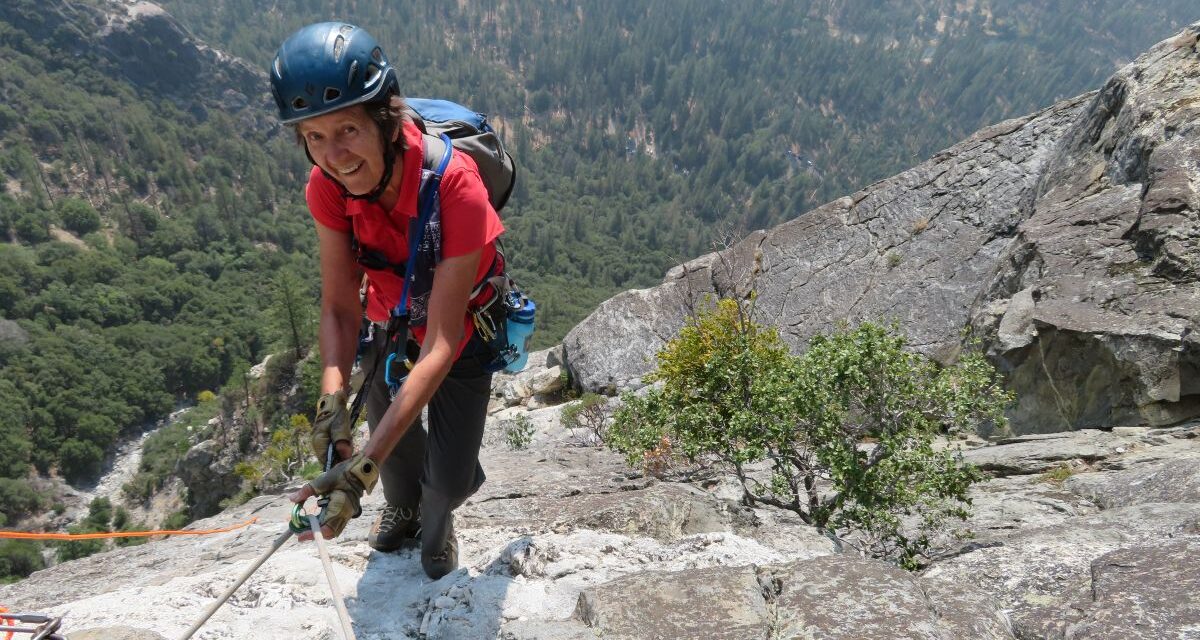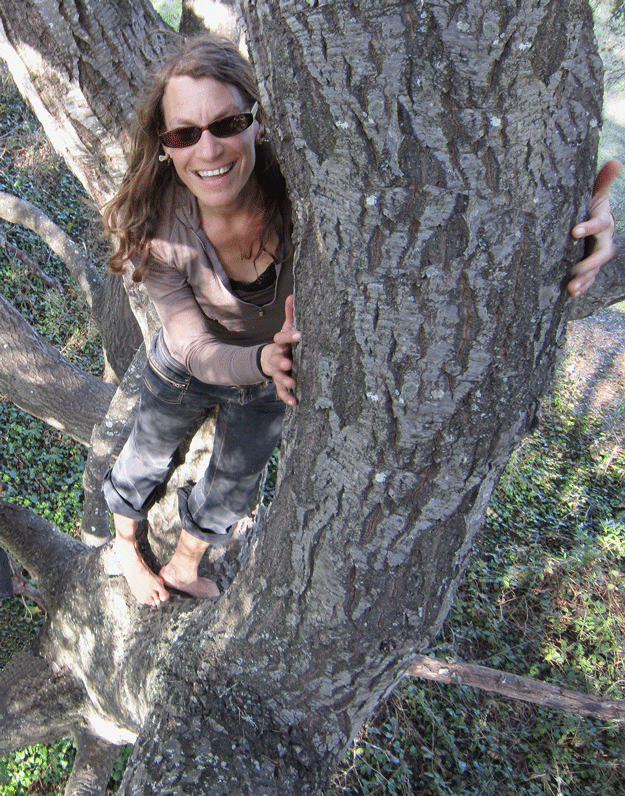- Climbing at Any Age - 09/19/2023
- Raising Conservation Kids - 10/20/2020
- Berkeley to Everest & Backin 14 Days - 01/27/2020
Climb Your Way to Health and Fitness, Both Physical and Mental
Rock climbing is an exhilarating way to stay fit, physically and mentally, and it’s not reserved for the young. Many climbers have gray hair and pensions, and some of us started late in life (I started at 59). We can climb outdoors because we aren’t bound by work schedules. Often we hike an hour or more to get to a climb surrounded by breathtaking scenery that’s only accessible by hiking. A climbing day gets you out there and moving!
Climbing requires some strength, but not as much as you might expect. I have skinny arms with no visible trace of muscle, yet two months before my 60th birthday, with only a year of climbing experience, I climbed Half Dome — the iconic almost-9,000 foot rock in Yosemite — with my son, Alex Honnold! Six years later, I became the oldest woman to scale El Capitan, the Yosemite monolith that my son climbs (without rope) in the Oscar-winning documentary Free Solo. But I still can’t do pull-ups.
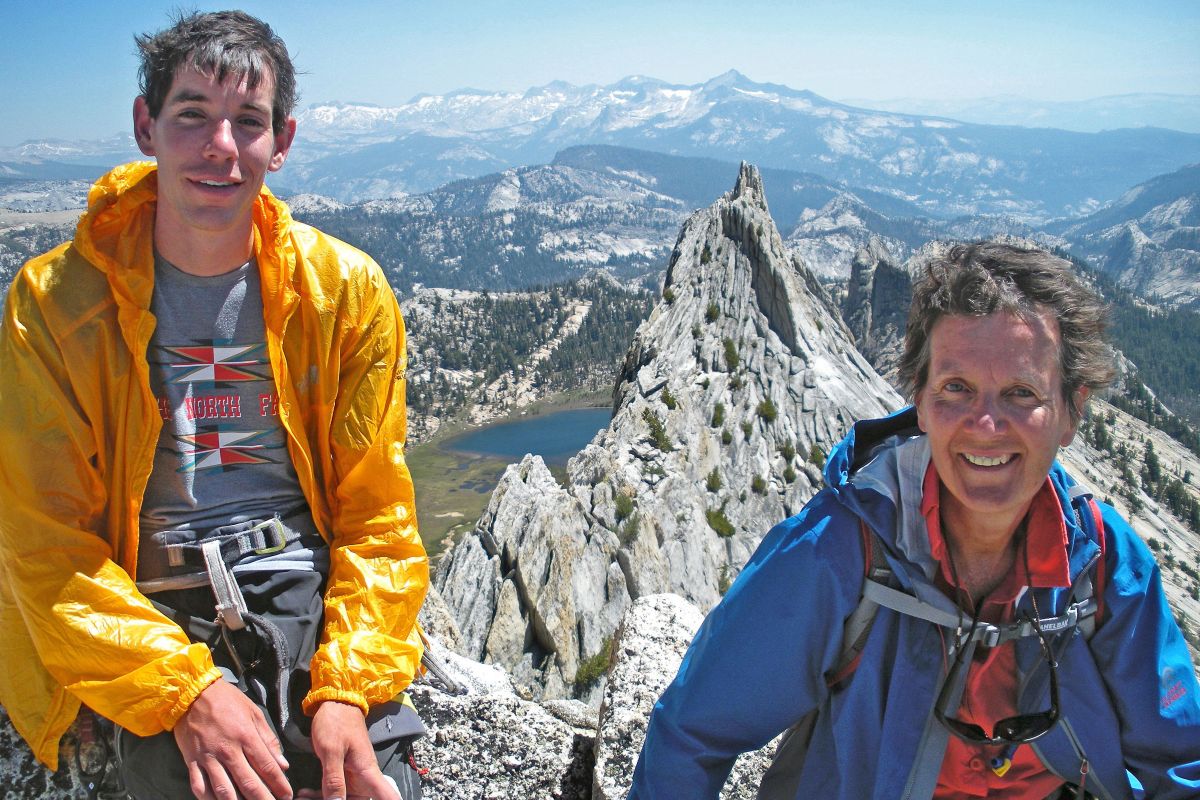
Wolownick and her son, Alex Honnold, the only person to have scaled El Capitan, Yosemite’s 3,000- foot granite wall, without a rope. The National Geographic documentary about that climb, Free Solo, won an Academy Award (Amy Mountjoy)
And while it tones the body, climbing is surprisingly cerebral; much of it takes place in the head, as you figure out body position, angle of pull, the right size of gear … or how to push back on fear.
Even if you never get outdoors, indoor rock climbing can also offer substantial health benefits. Keep reading for a glimpse into the benefits of this exciting activity, and some advice about how to get started.
Getting “High” and Getting Fit
Working your way up a rock wall requires some coordination and stamina, and lots of thought. It does not require body-builder muscles (but you will get stronger doing it). The first time I hiked up into the mountains to climb with my new climbing friends, I felt it the next day in my thighs and calves — but no more than after any day of hiking.
Most climbing gyms also have the usual gym equipment and machines, so you can keep in shape to prepare for climbing. Or you can simply get and stay in condition by climbing, which is a whole-body workout. It builds muscle, increases stamina, makes you more confident, builds friendships (although you can climb alone — a style called bouldering — it’s not recommended for older bodies), and if you do it outdoors, gets you out into some of the most beautiful terrain on the planet.
It’s All in the Head
Confronting your fears can be the biggest hurdle in climbing, for any age. I’d never felt comfortable looking over the edge in high places, so I was delighted to discover that it hasn’t been a factor while climbing. The rock is in front of your face, so even if you find yourself high up on a ledge, following a climb, you can focus on that and never look down. (You’ll want to, though — the views are spectacular!)
When people say “I’m afraid of heights,” what they really mean is that they’re afraid of falling off those heights. That fear goes away when you realize you’re held safely by a rope. Even if you “fall” off the climb, you’ll just dangle there, held in place by your belayer (the person at the other end of your rope) until you decide to continue, or to lower safely back down.
Besides knowing where to place your hands and feet while climbing, you’ll also need to judge things like angle of pull (body position), hanging or falling weight, and torque. Should you step up to the right, with the right foot, to reach the next hand-hold, or would twisting to the left get you closer? A climb is a continual sequence of decisions and judgments. Your mind is far too busy to allow fear to take hold.
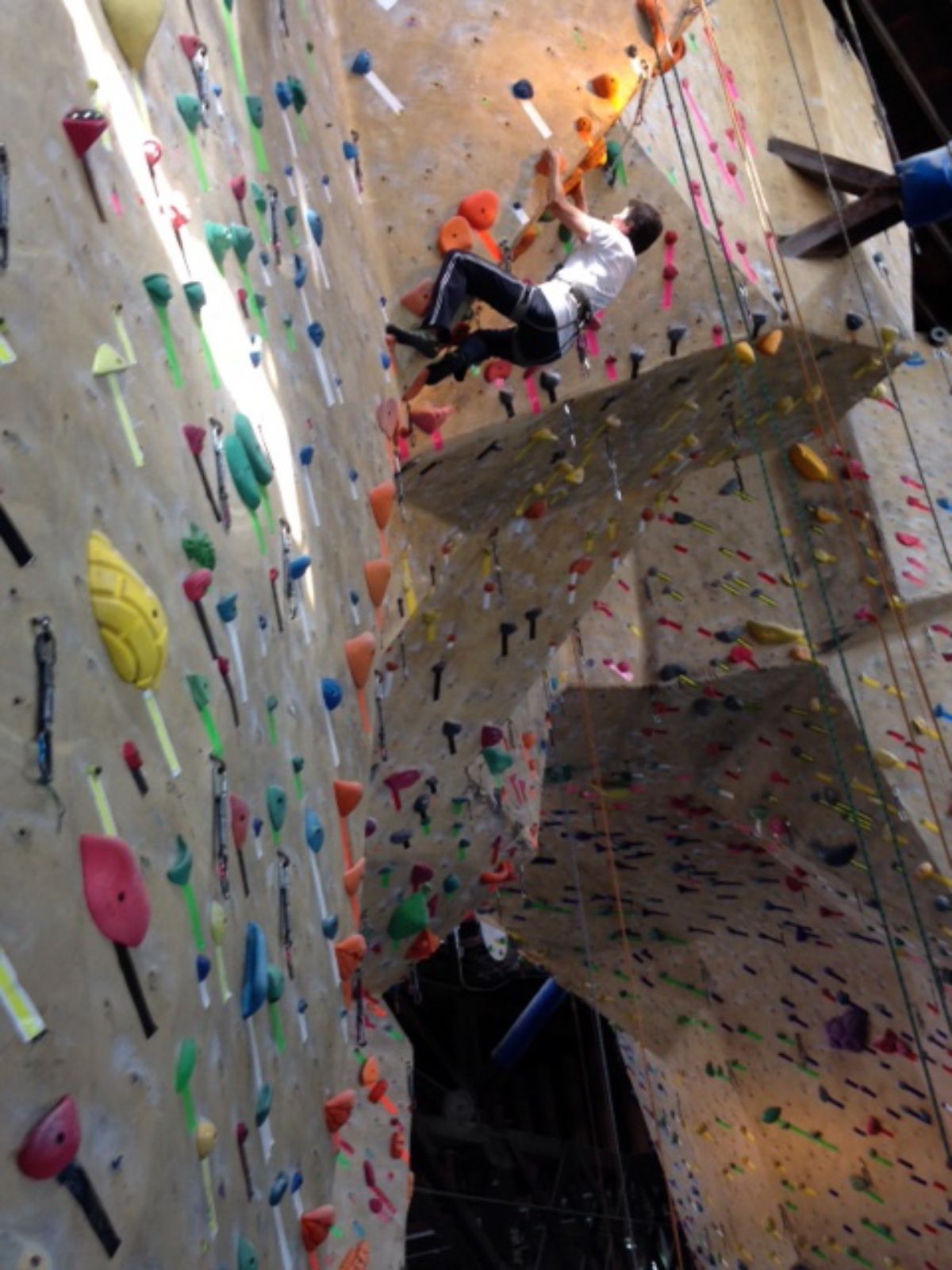
The author training at her local climbing gym, Sacramento Pipeworks (Michelle Altevogt)
Climbing for Serenity
Climbing can be the ultimate relaxation technique. Serenity and relaxation happen when you find yourself “in the zone,” or in “flow,” that state where nothing else exists and all cares and worries are forgotten. Climbing requires an intensity of focus that accomplishes that beautifully. A day of climbing, outdoors or in, can wash away the cares of the week.
Like a Fine Wine
Climbing older and wiser can keep you safer. Many climbers injure tendons, joints, fingers. Older ones, though, are often more in touch with their body’s particular frailties, and know how to protect it.
Where a young climber might dyno — leap — to a handhold, a more mature decision might be to down-climb a bit and try it from a different angle. The patience that comes with age can prevent rash decisions that could end in injury. We all eventually get to the top; some of us just get there more slowly. At my age, I’m fine with that.
Know Your Limits, but Don’t Be Afraid to Push Them
Be realistic about your physical condition. Start small. Do kids’ climbs. Get used to it slowly; it may take time to build up new muscle and to get accustomed to being up high. Eventually, you will be able to do things you didn’t think were possible.
I can’t count the number of times I’ve watched someone do a particular climb, then exclaimed, “I could never do that!” — or the number of times I turned out to be wrong. Learning to climb has taught me to push my limits, within my limits.
When my son suggested we climb Half Dome together, I thought he was joking. But after a year of climbing in the gym and on moderate outdoor climbs, I was ready. It turned out to be the most exhilarating day of my life! (Up until then; I’ve surpassed that many times in the last few years.)
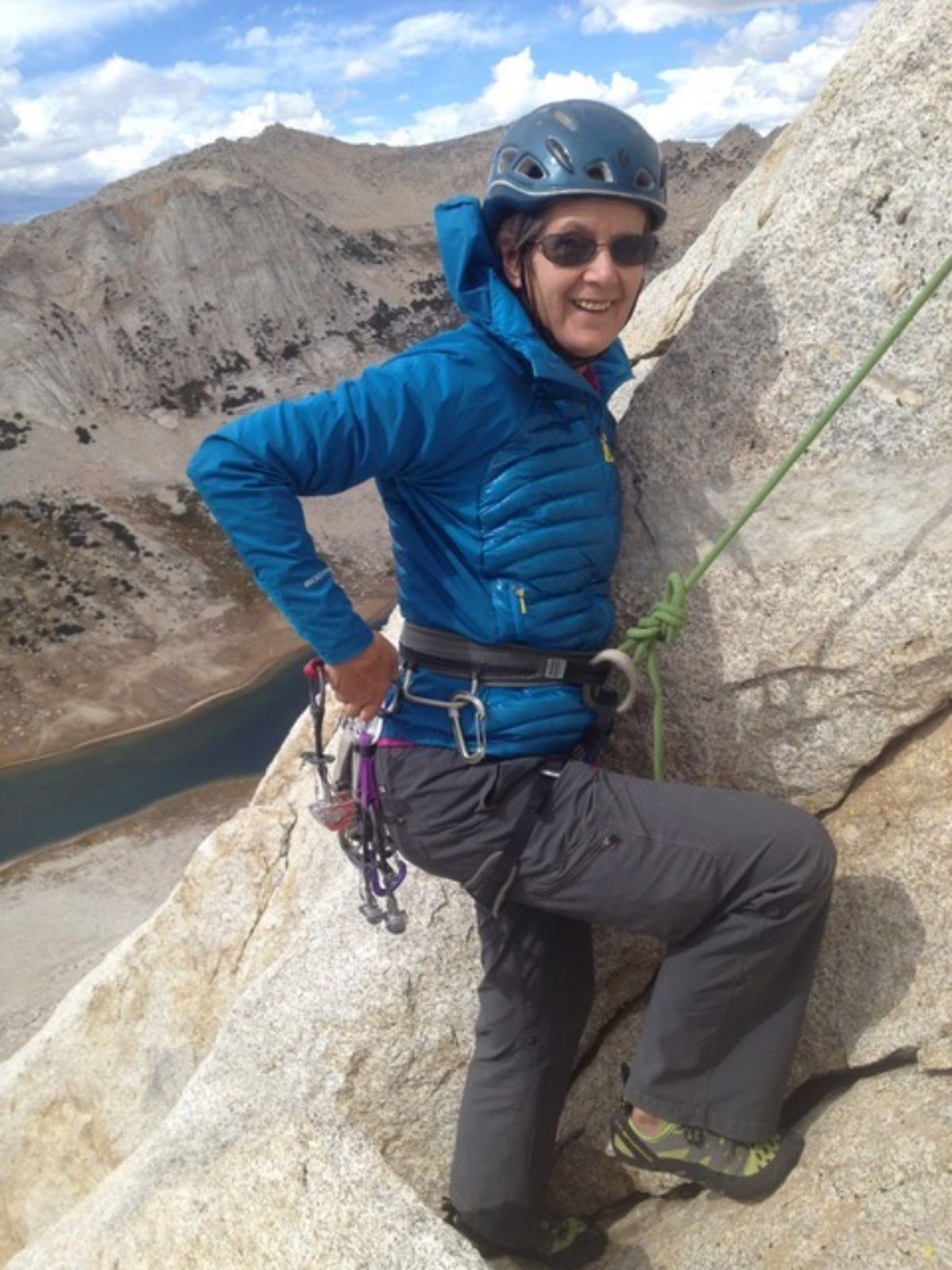
Wolownick enjoying a beautiful day on Mount Conness in the Sierra Nevada range (Andrew Altevogt)
Getting Started, Safely
Safety is paramount in climbing. Everyone, young or old, wants to come home from the crag healthy and ready to celebrate the day and climb again. Before you start, read up on safety practices and gear. There are many blogs, forums, videos, and books available that can teach you about climbing basics and etiquette.
But none of that takes the place of a real, live human being there to “show you the ropes.” Get familiar with the gear by browsing a sports equipment store and asking questions. Your local climbing gym probably has clinics and beginners’ classes to get you started. Some people choose to seek out the help of a personal climbing trainer.
Making Friends
Unless you’re one of the very few elite climbers out there, you can’t climb alone. It takes one person at each end of the rope. So how can you go climbing if you don’t know any climbers? That was my first concern. I was 59 and didn’t know a soul at the climbing gym. Luckily, climbers tend to be friendly, encouraging, and inclusive.
The first day, I rented my harness and shoes and wandered around smiling at potential belay partners. “Would you like a belay?” I’d offer whenever I encountered an odd-numbered group. Within a few hours, I had several new friends who asked me to climb with them again. In the past ten years, I’ve made more friends than in the previous thirty.
Hitting the Road
So, you’ve discovered you love it, and you’ve done all the routes at the outdoor climbing areas nearby. Now what? “Dirt-bagging” is one option — living out of your van while you visit other areas. After a day of climbing, though, I prefer motels, with a shower and a soft bed. Or a friend’s guest room.
Whichever level of luxury you prefer, you’ll find an endless array of climbing areas scattered around the country, and the globe. My son, a sponsored climber, lives mostly on the road. My road trips are far more limited than his — but just as much fun!
Most climbing gyms have a meeting board, where you can find other climbers to travel with. On-line forums abound. If you decide it’s time to enlarge your climbing horizons, you won’t lack for opportunities or company.
Have Fun — Stay Safe — Climb On!
***
Main image: Dierdre Wolownick on the East Ledges, the fastest way to descend El Capitan in Yosemite (Jannette Wing Pazer).
Read other articles by Dierdre Wolownick here.

